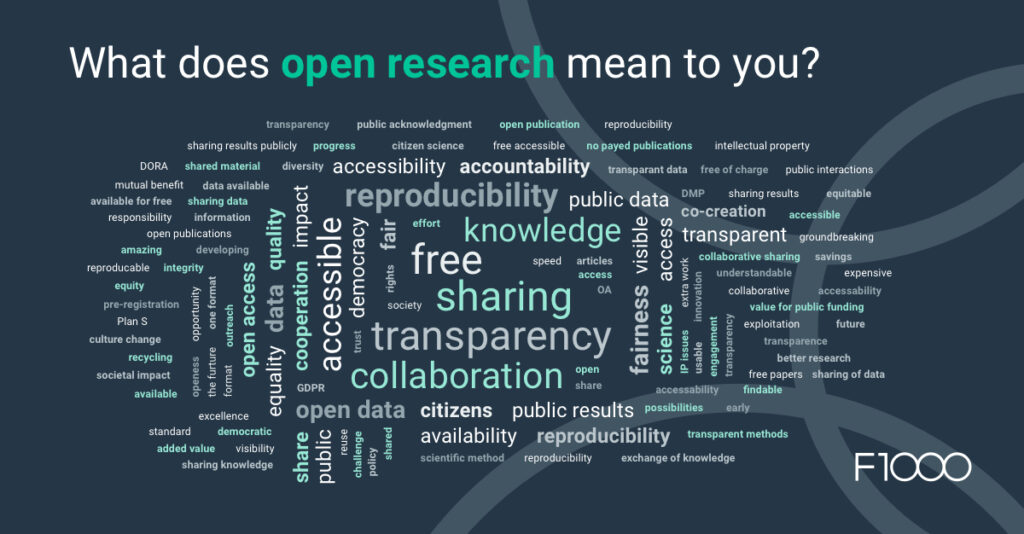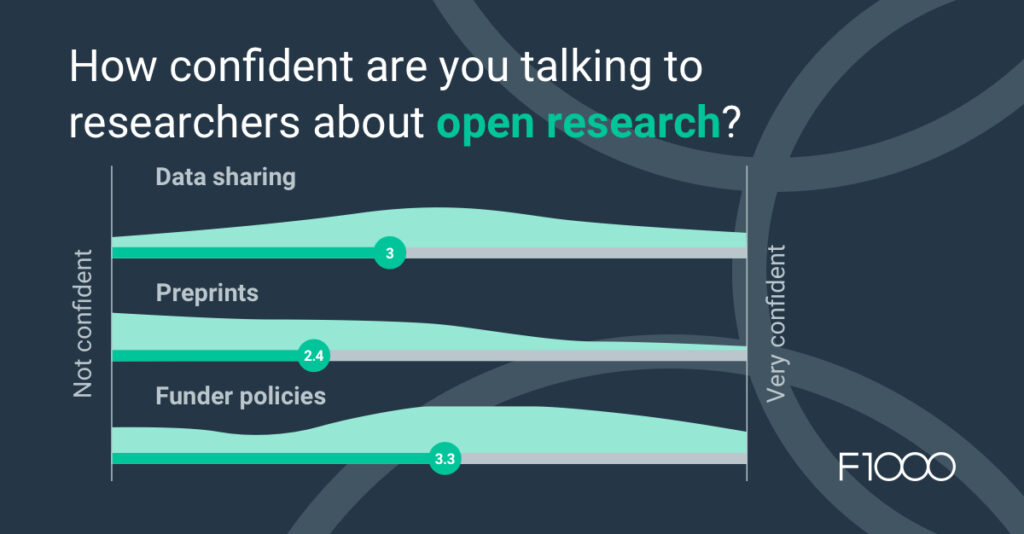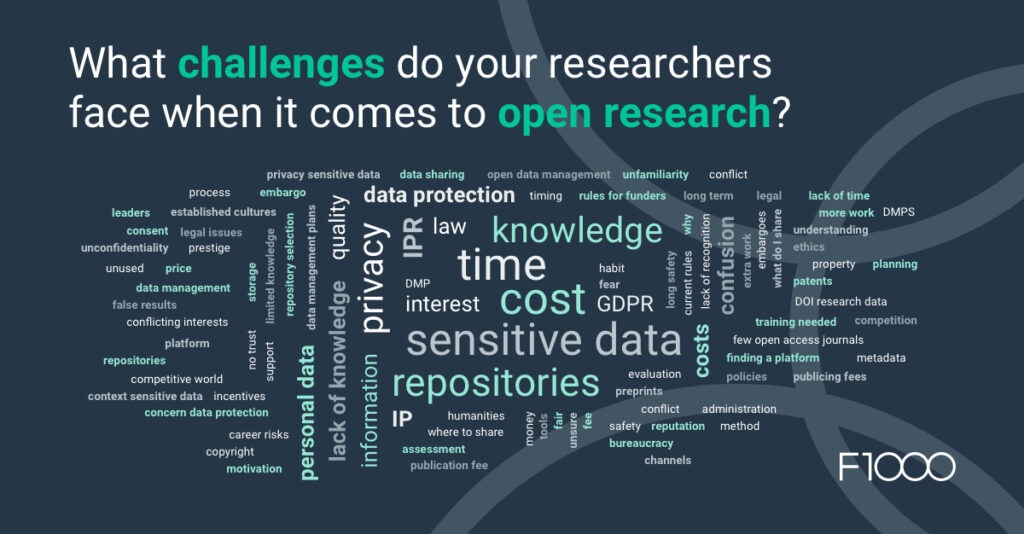
What do research managers and administrators think about open research in the UK and Europe?
Open research is increasingly being adopted by researchers, institutions, and funders who are embracing the various practices as a way to help deliver more constructive and effective research outcomes.
Research Managers and Administrators (RMAs) are at an intersection of researchers, institutions, funders, and publishers; often playing an active role in guiding and supporting time-stretched researchers. Given the increasing complexity of directives on how research should be conducted and shared – with geographical, funder, institutional, and subject-specific factors to take into consideration, their role is ever more important.
As such, their familiarity with – and understanding of – open research principles and options plays a vital role in increasing the adoption of openness and transparent sharing of research objects. Therefore, for publishers like us, engaging with – and listening to – RMAs is a step toward facilitating change and increasing adoption of open research practices.
In this blog, Matthew Cannon, Head of Open Research at Taylor & Francis, and Becky Hill, Strategic Partnership Manager at F1000, unpick some of the findings identified from a cross-sector dialogue with two groups of RMAs who shared their views on open research and responsible research practices.
The sessions were conducted as part of two conferences: one at the annual meeting of the Association of Research Managers and Administrators (ARMA) in October 2021 (online) and one at the European Association of Research Managers and Administrators (EARMA) in person in Oslo, Norway in May 2022.
What do research managers and administrators think of open research?
At both the EARMA and ARMA conferences, we asked RMAs what open research meant to them through interactive polling using the menti.com software. ‘Transparency’, ‘accessibility’, and ‘reproducibility’ were notable themes at both conferences; with delegates at EARMA highlighting ‘democracy’ as another key theme, and ARMA delegates highlighting ‘integrity’ and ‘equality’.
Moreover, some of the most well-known open data initiatives (e.g., FAIR data) are featured, as well as key benefits around discoverability and collaboration. It is also clear that the costs and value of open research are front and center of RMA minds, considering responses around ‘free access’, ‘expensive’, and ‘no paywall’.

The second question asked the RMAs in attendance to rank which areas of open research they get asked about most. For both sessions at ARMA and EARMA, the most frequent topic brought to RMAs’ attention was data sharing. At ARMA, this was then followed by sharing methods, and at EARMA the next most frequent topic was preprints.
Interestingly, when asked to share their confidence levels around talking about various facets of open research, RMAs were less confident talking to researchers about data sharing and preprints. Instead, they were most confident talking about funder policies, demonstrating how funders are increasingly influencing institutional and researcher activity.

Research managers and administrators still face challenges with open research
At the EARMA conference in Oslo, we also asked RMAs what challenges their researchers face when it comes to open research. The responses to this question were perhaps most illuminating, many of which circled around cost, sensitive data (and associated IP), and knowledge/understanding of the processes.
It’s also clear that when it comes to open research, credit and recognition are real issues, with a number of responses cropping up around this theme via ‘lack of recognition’, ‘career risks’, ‘competitive world’, as well as ‘reputation’.

Perceptions of open research
So, the initial question we posed was: What do Research Managers and Administrators think about Open Research in the UK and Europe? Whilst acknowledging the small sample size on both sides, and the potential crossover with some UK delegates at the EARMA conference, it’s clear that similar themes arose from both communities in the importance of transparency, reproducibility, and accessibility when it comes to open research.
However, subtle differences did seem to emerge – in that the UK audience focused more on equality and integrity as a benefit and the expense as a challenge. Whereas the audience at the EARMA conference placed focus on sharing, collaboration, and democratic practices.
It was also interesting to note that at the EARMA conference, the subject RMAs were asked second most frequently about was preprints and yet this was an area they felt least confident talking to researchers about.
The results of the polls gave us a snapshot of how open research is perceived by RMAs in the UK and Europe. There is certainly an appetite for uptake, but further support and resources are needed, particularly around preprints and data where there are persisting misconceptions or mistrust about adopting these practices.
From interest to adoption
Whilst there is appetite, it’s clear there are still barriers to adopting open research practices across the board. RMA roles are evolving to deal with the changing landscape of open research, but this rate of change varies across the board. For us, as publishers, it’s essential that we keep these results front and center in mind when evolving or developing our services, to ensure that open research maintains its core values of transparency, accessibility, equity, and reproducibility.
But beyond our own remit, it’s clear that engaging in cross-sector initiatives is essential; whether it’s influencing policy, training, or change in research assessment, metrics, and culture to ensure open research practices can be rewarded and recognized as responsible and worthwhile practice.
The future of research is clearly open, but there is still a way to go in embedding these practices in research culture.
Interested to know more about open research practices? Read here to learn more about key issues and the potential of open research.
About the authors
Matthew Cannon is Head of Open Research for Taylor & Francis. Matt has worked at Taylor & Francis for almost 15 years in a variety of editorial roles and moved to the Open Research team in 2019. Matt is a member of the Research Data Alliance and sits on the publisher advisory board of FAIRSharing.org and the Centre for Open Science.
Becky Hill is Strategic Partnership Manager for F1000, with a focus on open research publishing partnerships with institutions and universities. Becky has worked in academic publishing since 2011, with prior roles in journal editorial and business development, largely in the Humanities and Social Sciences.
